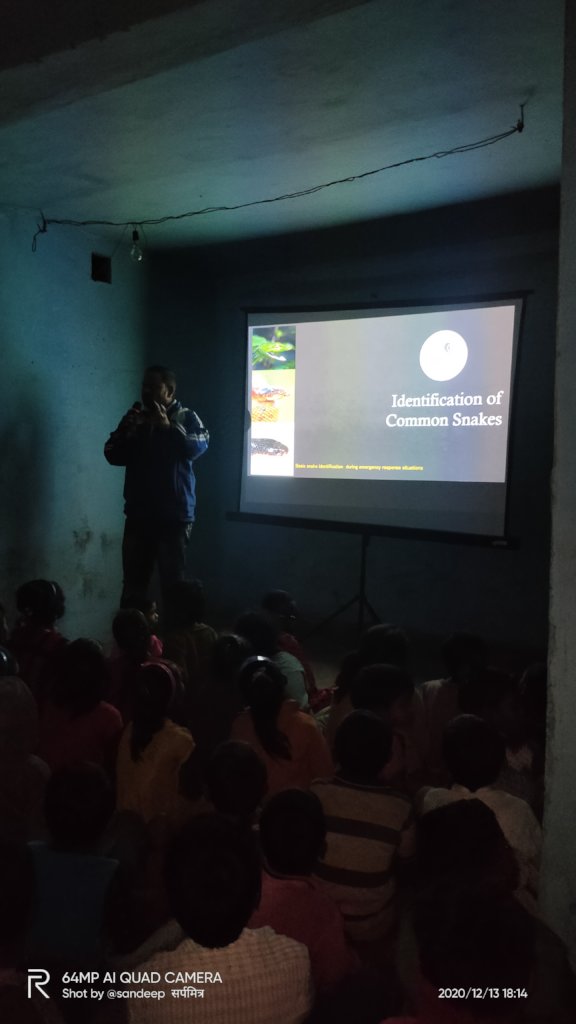By Leena Fernandez | Project Leader
Anjali Health Centre in Pithora had an eventful year in 2020. Well… the whole world had an eventful year in 2020. There is no downplaying the impact of the pandemic as we all struggle to find our balance in the new normal. And there is certainly no question about how devastating the death of a family member or a friend can be. Be it death from any cause – the coronavirus, a road accident, or snakebite.
A chance encounter in 2013 on a train travelling northward from Kerala to Delhi is what connected Indiansnakes.org to Anjali Health Centre (AHC). A casual conversation brought out the on-the-ground difficulties encountered by a small medical facility deep in rural India when treating snakebite cases.
When the Pithora Project began seven years ago, AHC was buying antivenom from the open market – sometimes at exorbitant rates when supply was limited. The lone doctor in the facility had never received training on snakebite management and followed standard treatment practice - every snakebite patient received antivenom, whether or not the patient displayed signs of envenomation. Over and above all of this was the fact that the community typically took a snakebite victim to a faith healer rather a mainstream medical facility. Most of the snakebite cases that AHC received were those that had been sent away by the faith healer as ‘past redemption’. Such patients were usually critical by the time they reached AHC and did not survive long.
Today AHC tells a very different story. Having received snakebite management training for a month at the start of the project in 2013, the doctor was able to treat patients much more effectively. Indiansnakes.org also ensured that AHC would never be in a situation where they would have to purchase antivenom at inflated prices by establishing a direct connection with the manufacturer. A low-cost ventilator was also procured for the hospital. Most importantly, the doctors were informed about simple do’s and dont’s of snakebite first aid and the significance of the ‘Golden Hour’. The ‘Golden Hour’ is the first 60 minutes after a bite when treatment is most effective. All of this information was passed on to each snakebite patient and the caregivers during their hospital visits.
Soon the snakebite recovery rate at AHC started to improve and word spread through the community about this hospital that was saving snakebite victims. Today, AHC has a recovery rate of over 95% and the local community prefers to take snakebite victims here rather than to a faith healer. The doctors report that they get regularly get patients from villages almost 50 km away. Looking back on 2020, AHC received about 120 snakebite cases between January and December.
As is common practice for snake identification, either a photograph is taken and shown to the doctors, or the snake is killed and brought to the hospital. In almost 15% of the snakebite cases, the snakes were killed to facilitate identification.
The community around Pithora are mostly farmers and snakes are natural rodent controllers. Removal of snakes from the environment will eventually result in increased rodent population and hence damage to standing crops and stored grain, severely impacting the farmer.
The Indian Snakebite Initiative and Indiansnakes.org work on the principle of ‘One Health’ and believe that the health of a person cannot be divorced from the wellbeing of the environment that he or she lives in.
In 2021, we are looking to begin community awareness workshops and snake rescue facilities in Pithora in addition to continuing support to AHC. The Pithora Project now aims to further reduce snakebite incidents through intensive awareness workshops and bring down the number of snakes being killed through interventions of the Indian Snake Rescue Network – the rescue and rehabilitation wing of Indiansnakes.org.
We are most deeply grateful to you for your patience and support and we look forward to being able to share frequent updates and stories on our newest initiatives.
Project reports on GlobalGiving are posted directly to globalgiving.org by Project Leaders as they are completed, generally every 3-4 months. To protect the integrity of these documents, GlobalGiving does not alter them; therefore you may find some language or formatting issues.
If you donate to this project or have donated to this project, you can receive an email when this project posts a report. You can also subscribe for reports without donating.
Support this important cause by creating a personalized fundraising page.
Start a Fundraiser